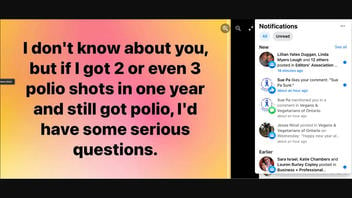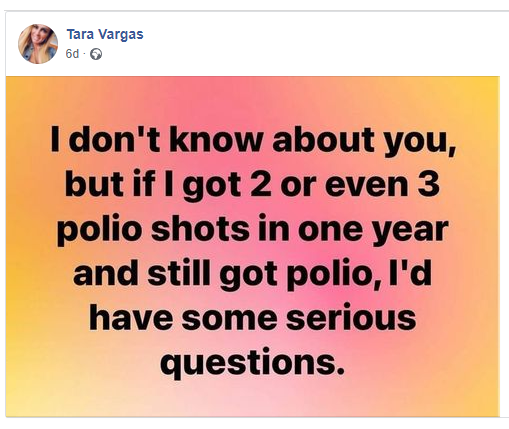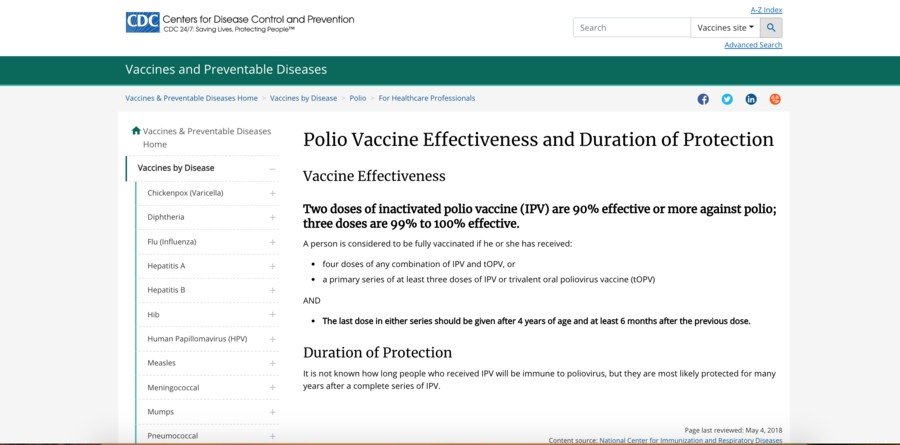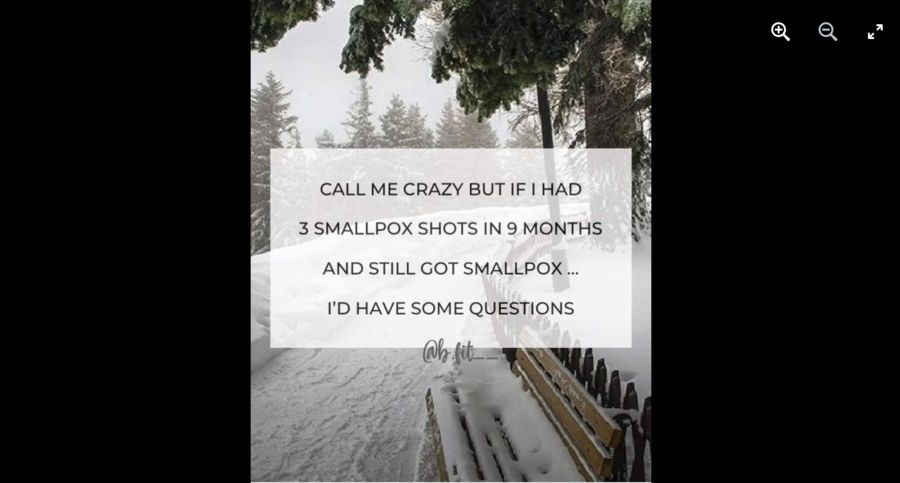
Are people who get two or three shots of the polio vaccine 100% protected, with no breakthrough cases ever? No, that's not true: The statement that someone would "have questions" if they had gotten two or three polio vaccines and still got polio is missing context. The polio vaccine does not offer absolute and complete protection against the disease.
"Two doses of inactivated polio vaccine (IPV) are 90% effective or more against polio; three doses are 99% to 100% effective," the Centers for Disease Control and Prevention says about the polio vaccine. There are rare cases of individuals contracting polio even with the shots.
The statement appeared as a Facebook post (archived here) on December 30, 2021. It opens:
I don't know about you, but if I got 2 or even 3 polio shots in one year and still got polio, I'd have some serious questions.
This is what the post looked like on Facebook at the time of writing:
(Source: Facebook screenshot taken on Thu Jan 6 19:44:47 2022 UTC)
The polio vaccine is very effective and polio has been eradicated in the United States. But there is a misconception that previous vaccines like the polio vaccine were just one miracle shot while in fact more than one were needed to prevent the disease. According to the CDC, multiple shots ensure the best protection against the disease.
Other social media posts have been using smallpox as another vaccine comparison, such as one stating: "Call me crazy but if I had 3 smallpox shots in 9 months and still got smallpox ... I'd have some questions."
Smallpox was eliminated from the world because enough people took the vaccine to stop the spread of the virus. According to the CDC:
After smallpox was eliminated from the world, routine vaccination against smallpox among the general public was stopped because it was no longer needed. However, because of concern that variola virus might be used as an agent of bioterrorism, the U.S. government has stockpiled enough smallpox vaccine to vaccinate everyone who would need it if a smallpox outbreak were to occur.
When there is NO smallpox outbreak, you should get the smallpox vaccine if you are a lab worker who works with virus that causes smallpox or other viruses that are similar to it.
If you need long-term protection, you may need to get booster vaccinations regularly. To stay protected from smallpox, you should get booster vaccinations every 3 years.
The post does not mention COVID-19 but it implies that needing two shots and a booster of a COVID-19 vaccine is not an effective measure of prevention for the coronavirus, as so many people are experiencing breakthrough cases. As of January 6, 2022, the CDC recommends that all eligible people get the vaccine and a booster shot to prevent severe illness and death from the virus. Having a COVID-19 vaccine does greatly improve the odds of a person not contracting the virus and if they do, the vaccine can prevent them from becoming seriously ill or dying from SARS-CoV-2. Just as wearing a seatbelt or a helmet does not prevent a crash, the vaccine helps mitigate the injuries that can occur in the case of an accident.
From the CDC page titled, "The Possibility of COVID-19 after Vaccination: Breakthrough Infections":
- COVID-19 vaccines protect everyone ages 5 years and older from getting infected and severely ill, and significantly reduce the likelihood of hospitalization and death.
- Getting vaccinated is the best way to slow the spread of COVID-19 and to prevent infection by Delta or other variants.
- A vaccine breakthrough infection happens when a fully vaccinated person gets infected with COVID-19. People with vaccine breakthrough infections may spread COVID-19 to others.
- Even if you are fully vaccinated, if you live in an area with substantial or high transmission of COVID-19, you - as well as your family and community - will be better protected if you wear a mask when you are in indoor public places.
- People who are immunocompromised may not always build adequate levels of protection after an initial 2-dose primary mRNA COVID-19 vaccine series. They should continue to take all precautions recommended for unvaccinated people, until advised otherwise by their healthcare professional. Further, CDC recommends that moderately or severely immunocompromised people receive an additional primary dose of vaccine.
What We Know about Vaccine Breakthrough Infections
- Vaccine breakthrough infections are expected. COVID-19 vaccines are effective at preventing most infections. However, like other vaccines, they are not 100% effective.
- Fully vaccinated people with a vaccine breakthrough infection are less likely to develop serious illness than those who are unvaccinated and get COVID-19.
- Even when fully vaccinated people develop symptoms, they tend to be less severe symptoms than in unvaccinated people. This means they are much less likely to be hospitalized or die than people who are not vaccinated.
- People who get vaccine breakthrough infections can be contagious.






















